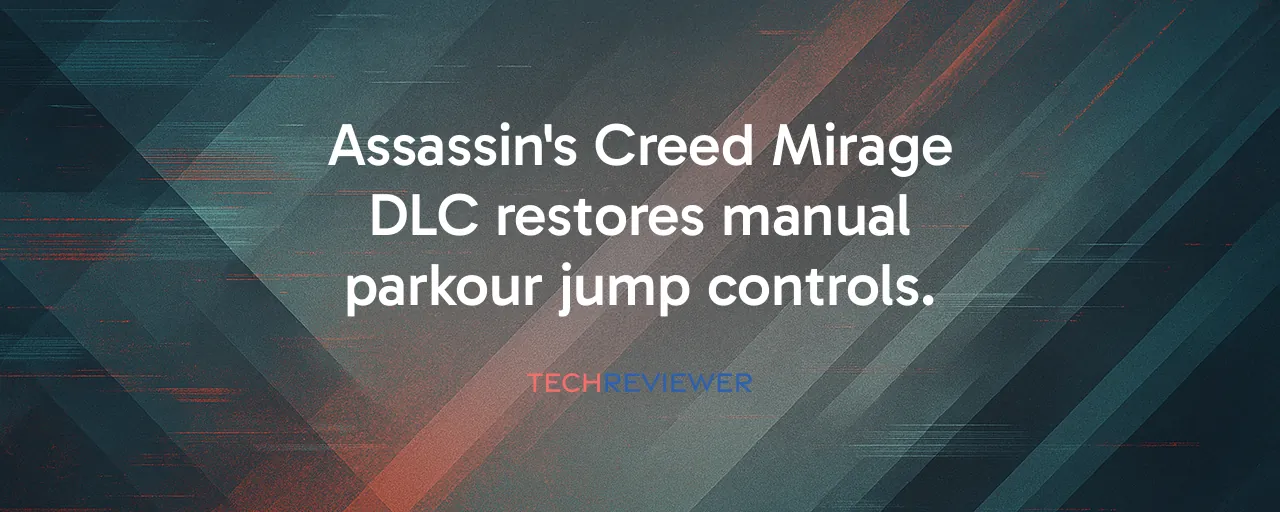Reclaiming Parkour Freedom
On November 18, 2025, Assassin's Creed Mirage players will rediscover a long-lost thrill: the ability to manually control their jumps. The Valley of Memory DLC, a free update, brings back this feature absent since 2014's Assassin's Creed Unity, letting players dictate their parkour flow across ninth-century AlUla. For fans who've spent years on forums like Reddit begging Ubisoft to restore this mechanic, it's a victory they've long awaited.
Manual jumps let players leap on command, unshackled from the automated systems that have defined the series since 2015's Syndicate. Combined with new side and back ejects that don't require a landing spot, this update empowers players to chain creative parkour sequences in ways the base game's rigid mechanics couldn't. It's a nod to the franchise's roots, when mastering movement felt as central as stealth or combat.
Balancing Skill and Accessibility
Ubisoft's decision to reintroduce manual jumps isn't just about nostalgia; it's a bold experiment in game design. The toggleable system lets players choose between precise manual control or the familiar automated parkour, catering to both veterans and newcomers. Long-time players, who fondly remember scaling Renaissance Italy as Ezio, gain the freedom to craft daring rooftop runs. Meanwhile, those accustomed to the streamlined traversal of Origins or Valhalla can stick with automation, ensuring the game remains approachable.
Yet, this dual approach raises questions. Accessibility advocates in the gaming community point out that manual jumps demand quicker reflexes and more button inputs, which could challenge players with mobility limitations. Ubisoft mitigates this with a toggle option, but the real test lies in how missions and challenges are balanced. If the new AlUla quests favor manual precision, some players might feel left behind despite the inclusive design.
Learning From Unity's Highs and Lows
To understand the significance of this shift, look back at Assassin's Creed Unity. Launched in 2014, Unity dazzled with its intricate parkour system, blending manual jumps with a parkour up/down mechanic for controlled climbs and descents across Paris. Players loved the fluid animations but often grumbled about inconsistent responsiveness, where the game sometimes misread their intent. Despite its flaws, many still call it the series' parkour peak, a sentiment echoed across YouTube breakdowns by creators like Leo K.
Unity's ambition came at a cost. Its complexity frustrated casual players, prompting Ubisoft to simplify movement in Syndicate and beyond, stripping out manual jumps entirely. The Valley of Memory DLC feels like Ubisoft revisiting Unity's lessons, aiming to blend player agency with smoother controls. The new control scheme, designed to ease rooftop transitions, suggests developers have tackled past responsiveness issues head-on.
How Mirror's Edge Sets a Benchmark
Ubisoft isn't alone in wrestling with parkour's balance of freedom and ease. Mirror's Edge Catalyst, released in 2016 by EA DICE, offers a compelling comparison. Its first-person parkour emphasized precise timing and manual inputs, letting players like Faith chain wall-runs and jumps with surgical accuracy. The game's open world rewarded creative routing, much like what Mirage's DLC aims for, but its steep learning curve alienated some players who found the controls unforgiving.
Catalyst's approach shows the potential and pitfalls of skill-driven parkour. While it thrilled dedicated players, its lack of accessibility options limited its reach. Ubisoft seems to have taken note, offering toggleable controls to broaden appeal. Yet, Mirage's challenge lies in ensuring manual jumps feel rewarding without making automated systems seem inferior, a delicate balance Catalyst struggled to achieve.
What This Means for Ubisoft's Future
The Valley of Memory DLC, with its six hours of new quests and replayable Animus Sequences, serves as more than a content drop; it's a testing ground for Ubisoft's design philosophy. The enthusiastic buzz on social media following the October 6, 2025, announcement shows players are eager for mechanics that reward skill. This could shape future titles, like the Black Flag remake, though its RPG-heavy direction raises doubts about parkour's role.
Additionally, the DLC's AlUla setting, tied to a reported partnership with Saudi Arabia's Public Investment Fund, has sparked debate among Ubisoft developers about ethical concerns. While these issues don't directly impact parkour, they highlight the broader context of Ubisoft's decisions. For now, the return of manual jumps signals Ubisoft is listening to its core players, but the studio must keep balancing creativity with inclusivity to sustain the franchise's broad appeal.
